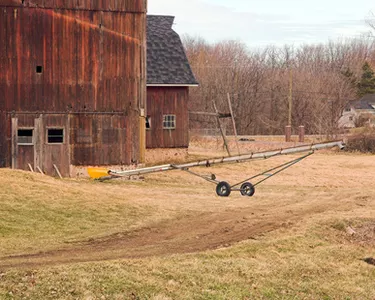
If you grow a cash crop on your property, you can get it registered as a farm with the IRS. You will then be issued a farm tax ID number, which will entitle you to certain tax benefits. Most of the deductions you can take for equipment and expenses are no different than those available to any other type of business. The real benefits are seen with estate taxes when you pass the farm on to your heirs.
Video of the Day
Video of the Day
What Qualifies As a Farm?
Before you consider tax deduction heirs, let's take a closer look at the stipulations for a farm tax ID. Although each state has their different requirements, there are a few basic elements set by the federal government.
Farming is defined as the use of your personal property for growing produce, livestock, game animals, poultry and fish. The addition of a greenhouse to the property, maintaining a working ranch for cattle, working a plantation or growing an orchard all meet the standards for a farm tax status. You must have reached all prerequisites before filling out an application.
Acquiring a Farm Tax ID
When you are ready to apply, the IRS has links to free forms that you can print off the IRS website and fill out. Once the IRS has approved your application, you then need to reach out to your state tax department to receive your tax ID number. Just be aware that some states will require an in-person application process. In addition, some farm tax IDs will last only a year and will require reapplication (be sure to check with your state department).
Deferment of Taxes
Estate taxes can require the heirs to a property to immediately pay more than half the property's value to the federal government upon the death of the owner. This has frequently resulted in the loss of the family property, which in some cases must be sold to pay this bill. But those with a farm tax ID number can elect to defer these payments longer than the owners of other types of properties can.
Minority Interest Discount
If a property with a farm tax ID number is owned by several different parties, each with a minority interest, this can entitle them to certain estate tax deductions. Since such a property will be considerably more difficult to sell on the open market than those with only one party of owners, it is given an IRS discount, and thus valued lower than its actual price for estate tax purposes, resulting in a lower bill.
Special Use Valuation
Normally, when estate taxes are assessed, the property is valued according to the most profitable use it can possibly have, regardless of what it is actually being used for by the present owners. This results in maximum revenue gain for the government. However, one of the benefits of having a farm tax ID number is that you can value your property according to its actual use at present, which is called a "special use valuation."
Conservation Easement Deductions
A property with a farm tax ID number can often obtain a conservation easement restricting it to agricultural use. A conservation easement, is an agreement between a landowner and a government restricting the usage of particular land to within certain boundaries for the conservation of natural resources.
This becomes binding upon future owners of the property as well. Since these restrictions may lower the property value, it entitles the owners to estate tax deductions. It could potentially bring the property value so low that it won't even qualify for any taxes at all.
The 2017 Tax Cut and Jobs Act has raised the amount of the estate's value before any tax would be levied on the property. In 2021, the base value of $11.7 million is exempt from taxes, and this goes up in 2022 to $12.06 million. This act protects estates until 2026 when the value will drop back down to $5 million, where it was previously set.
Consider Also: Depreciation of Business Assets: Definition, Calculation & How it Affects Your Taxes
Benefits for Owners and Heirs
In conclusion, if a donor wants to protect a piece of property that is under a conservation easement, he should leave it in a trust or give it to a federal agency. In this case it benefits the donor with a charitable tax deduction on their federal return and keeps the property from being sold off if an heir can't afford to pay the taxes on it.